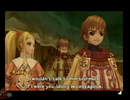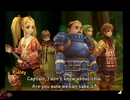|
|

|
PLATFORM
|
PS2
|
BATTLE SYSTEM
|

|
INTERACTION
|

|
ORIGINALITY
|

|
STORY
|

|
MUSIC & SOUND
|

|
VISUALS
|

|
CHALLENGE
|
Moderate
|
COMPLETION TIME
|
30-50 Hours
|
|
OVERALL

|
+ Tight battle system with tons of recruitable characters.
+ You can actually pause the game.
+ Sounds and looks nice.
- Some missable characters.
- Save system is a tad stingy.
- Lip-syncing of voices is a bit off.
|
Click here for scoring definitions
|
|
|
Japanese developer tri-Ace has made a name for itself with its RPGs containing significant real-time elements, such as the Star Ocean and Valkyrie Profile series. During the PlayStation 2 era they decided to deviate from these franchises with Radiata Stories, a unique action-RPG that proves to be a solid experience worthy of the developer's name.
Radiata Stories takes place in a fantasy world with humans and plenty of nonhumans, albeit one with modern conveniences such as radios, electricity, and apartments. Centering the game's world is the titular town of Radiata, controlled by several guilds, and whose residents have had occasional tensions with the nonhumans due to a disease called Algandars. Protagonists include Jack Russell, a carefree teenager, and Ridley Silverlake, a sarcastic knight who appreciates a good burn on Jack. The story largely focuses on the tensions between the humans and nonhumans, with Jack in part attempting to resolve trade disputes between them, as well.
During his quest, Jack can recruit 150+ characters with unique backstories and personalities by performing various tasks for them or even engaging in one-on-one duels with them by kicking them a few times. Enemies in Radiata's sewers, outskirts, and the occasional dungeon are visible as well, with a battle commencing whenever Jack approaches them, although some require a kick to begin the fight. Enemies can ambush Jack's party, in which case he and his allies briefly fall under confusion status.
Jack and his three active allies, if present, engage in real-time combat with the enemy, with the player controlling Jack and the A.I. mostly controlling his companions. Jack can equip different kinds of weapons, including small/big swords, spears, and axes, with the player also able to customize his attack strokes in and out of battle, and new strokes learned as Jack kills enemies. As Jack and his friends attack the enemy, the Volty Gauge gradually fills up to a hundred points, with Jack able to consume ten to execute a more powerful Volty Blow.
 You have the right to remain BURNED!
You have the right to remain BURNED!
|
|
If Jack has learned it for a certain type of weapon, he can execute a far more powerful Volty Blast against an enemy that requires a hundred Volty Points. Jack also eventually learns Links, which require a few Volty Points and put the party into a certain attack formation with various effects. While in a Link formation, all characters share their innate Skills, which have certain effects such as resistance to certain ailments and elements. The more Jack uses Links, the more likely he will learn Skills from his allies, with Jack able to equip one at a time, each having five levels that gradually increase the more he fights.
The player can also use Volty Points to execute A.I. commands for individual characters or the entire party, many of which books bought at a store in Radiata can teach. Other combat moves include defending, counterattacking while defending, and using consumable items. Losing a duel results in Jack leaving the battle with one HP, while death in a normal battle results in a Game Over and trip back to the title screen, and given the slight stinginess of the save system, it's best to play carefully. Even so, the battle system is tight and enjoyable, with a camera that keeps a good distance from the characters, as well, something other action games could take a hint from (*cough* Kingdom Hearts and Zelda *cough*), and the only real fault being the slight delay between item use and their effects.
As for interaction, one could somewhat consider Radiata Stories to be a sandbox RPG, given the vast world and freedom of exploration at times, but unlike most other less linear RPGs, the game actually does a decent job telling players how to advance the main storyline when they're through with exploring the world as much as they can. The menus and shopping aren't terribly troublesome, either, and that all characters but Jack have unchangeable equipment spares players a character management nightmare. That the game actually allows players to pause (except during FMVs) is also a nice addition, with this reviewer dumbfounded at how many Japanese RPGs fail to include this laughably simple feature. The only real hiccups are the lack of a scene-skip option and the somewhat stingy save system, but even so, the controls are above average.
Radiata Stories is undoubtedly an inventive game, given its massive playable cast with numbers exceeding even those of the Suikoden games, alongside an inventive battle system and modernistic fantasy world. The system where recruitable characters have fixed schedules during day and night somewhat comes from The Legend of Zelda: Majora's Mask, but otherwise, the game is unique among tri-Ace RPGs and other games in the genre.
 "It's no good, Ridley! I cannot reach the controls!"
"It's no good, Ridley! I cannot reach the controls!"
|
|
Radiata Stories's contemporary fantasy setting and generally lighthearted plot are nice breaks from the typical norm. Jack is a typical annoying RPG protagonist, but is luckily subject to frequent burns by Ridley, with their chemistry providing decent comic relief early on in the game. A plot branch towards the end also has some effect on the story, although many of the guild missions don't add much to the main storyline. An epilogue for all collected characters a la the Suikoden games would have been nice, as well, but luckily, all characters have description and backstory in the game menus. Overall, the story is a reasonable driving factor throughout the game.
Radiata Stories also marks the first time Motoi Sakuraba doesn't compose the soundtrack for a tri-Ace game, with Noriyuki Iwadare of Grandia, Lunar, and Growlanser fame filling his shoes. His style somewhat differs from his other works, although it fits the upbeat mood of the game well, with some tracks resembling cheesy sitcom music during a few cutscenes. The voice acting, aside from Jack's avian grunts in battle and often poor lip-syncing, is also on par with that of the Digital Devil Saga duology, and ultimately, the game is easy on the ears.
The world of Radiata Stories, moreover, is simply gorgeous, even more so on a widescreen high-definition television, with a distinct anime style emphasizing autumnal hues, and the game making the rare decision of having different armor affect the protagonist's appearance. There are some minor imperfections during cutscenes like blocky hands and some pixelated texturing, but these are negligible flaws in an otherwise beautiful title.Originality & Story.
Finally, the game can last players a while, about thirty to fifty hours, a little more with the post-game dungeon, not to mention the endless recruitable characters. In conclusion, Radiata Stories is a nice feather in tri-Ace's development cap, what with its tight but enjoyable battle system, decent control, fun story, good music, and beautiful visuals. It does have some minor faults such as the somewhat stingy save system, but it's undoubtedly one of the best RPGs for the PlayStation 2, not to mention best titles tri-Ace has ever developed, and can luckily be bought dirt-cheap nowadays.
Review Archives
|









